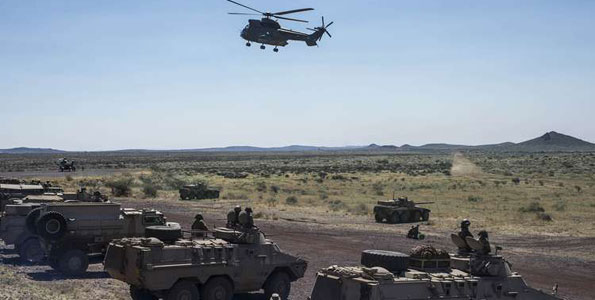Cameroon to host logistics base of African Union Standby Force

An African Union Standby Force (ASF) that would intervene to restore peace and security in member states will soon go operational.
Whereas it will come under the peace and security commission of the AU in Addis Ababa, its logistics headquarters will be based in the Cameroon port city of Douala, in the central African sub-region.
The basing agreement was signed in the Cameroon capital Yaounde on Monday by the AU peace and security commissioner Smail Chergui and Cameroon’s defence minister Joseph Beti Assomo.
“It is a very important moment, not only for Cameroon, but for the whole continent to really have it signed so that we can now implement it and have the force ready as fast as possible. And we are determined to do so,” Mr Chergui said.
The determination by the AU to get the standby force fully operational is coming at a time parts of the continent like the Lake Chad basin are facing serious security challenges posed by the Nigerian jihadist group, Boko Haram. No mention, though, was made on when the force will be activated.
The ASF will comprise military, police and civilian components drawn from all the five regional blocs of Africa: EASFCOM, ECCAS, ECOWAS, NARC and SADC.
Its operationalisation was initially meant for 2008, but was put off at least three times due to what observers described as political differences and disagreements between member states.
But given the state of insecurity especially the Lake Chad Basin, geopolitical strategists in the region are of the opinion that the force’s operationalisation should be soonest.
Disgruntled soldiers
Mr Chergui’s visit to Yaounde coincided with the October 12 ‘deadline’ which, according to local newspaper reports, was given the Cameroon government by a contingent of the country’s soldiers who recently staged a public protest against unpaid allowances from the AU/UN peacekeeping mission in neighbouring Central African Republic.
A local tabloid, The Post, quoted an unnamed soldier as saying that they would “make ourselves heard in any other way that will be surprising to many” if the allowances were not paid by the Monday deadline.
Nonetheless, Mr Chergui told reporters that he had discussed the issue with the Cameroon defence minister at an earlier meeting prior to the signing of the ASF agreement.
“I informed him [the Cameroon minister] that this issue of paying the soldiers from Cameroon who helped us in the Central African Republic has now been finalised,” the AU commissioner said.
“We also took the occasion to review our common endeavour in combating terrorism especially Boko Haram in this region,” he added.
Cameroon president Paul Biya had ordered the payment of the allowances from state coffers awaiting reimbursement from the AU.
The protesting soldiers subsequently returned to the barracks though according to local news reports, they have been grumbling that their dues were not fully paid.
However, Mr Chergui was categorical: “At this moment we are talking, I can assure you the money was transferred last Friday.”
The Algerian diplomat who was sworn in as AU commissioner for peace and security on October 12, 2013, was also received at the Cameroon State House by the Secretary-General at the Presidency, Mr Ferdinand Ngoh Ngoh, on behalf of President Biya.
The EastAfrican